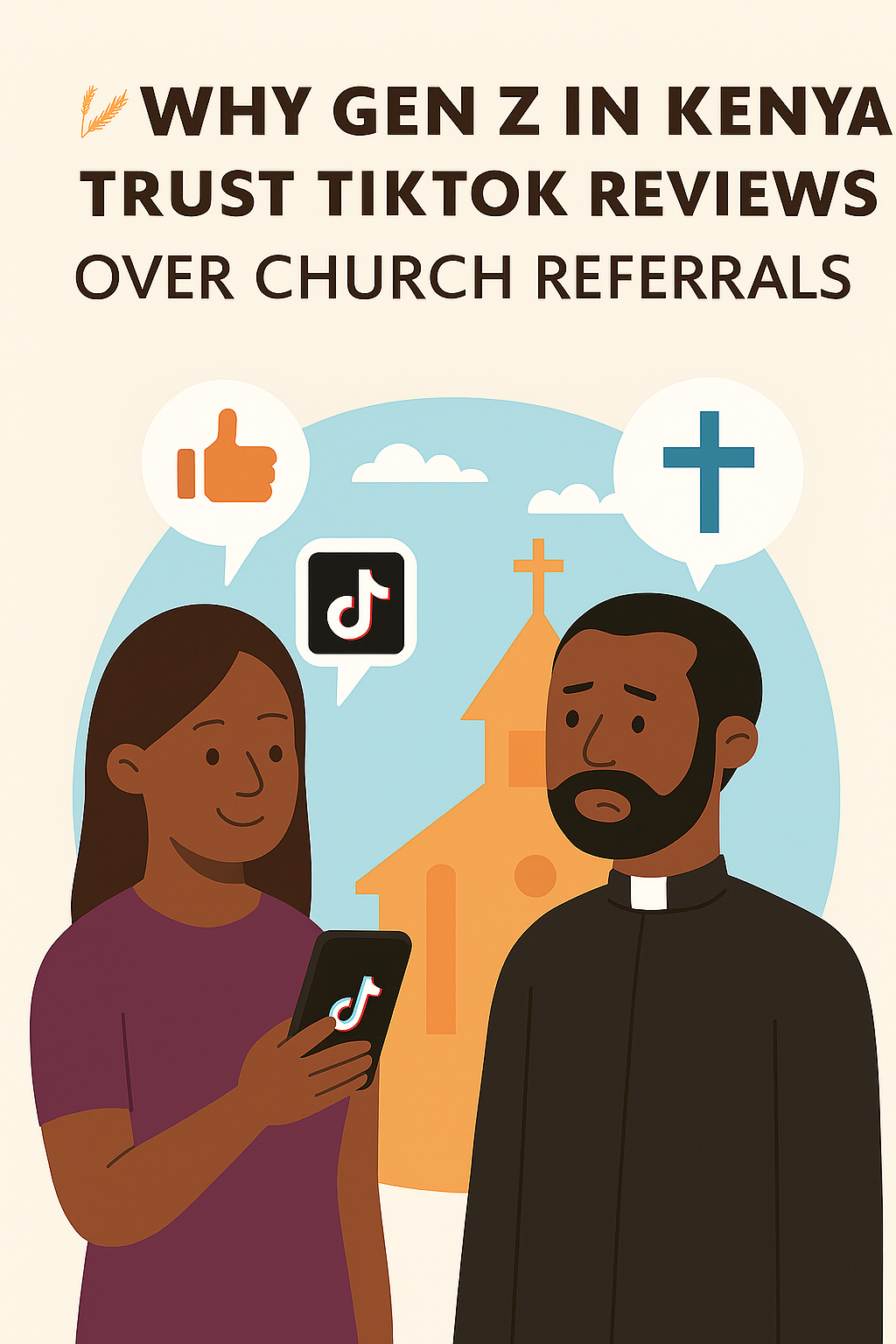From Sunday sermons to swipe-worthy service hacks—how Kenya’s youth are redefining trust, discovery, and digital dignity.
🧠 Introduction: The Shift from Sacred to Swipe
In Kenya’s rapidly digitizing economy, a quiet revolution is underway. Gen Z—those born between the late 1990s and early 2010s—are rewriting the rules of trust, influence, and service discovery. Where older generations leaned on church referrals, family recommendations, or neighborhood whispers, today’s youth are turning to TikTok, Instagram Reels, and WhatsApp statuses to find their next fundi, salon, or side hustle.
This isn’t just a trend—it’s a tectonic shift in how trust is built, how services are verified, and how digital dignity is earned.
📱 TikTok as the New Pulpit
TikTok’s rise in Kenya isn’t just about dance challenges or lip-syncs. It’s become a marketplace of micro-reviews, DIY hacks, and brutally honest service testimonials. Gen Z users are more likely to trust a 30-second video showing a fundi fixing a sink than a verbal endorsement from a church elder.
Why TikTok Wins:
- ✅Visual Proof: Seeing is believing. A video of a salon transformation or a mechanic fixing a boda speaks louder than words.
- ✅Authenticity: TikTok’s raw, unfiltered vibe feels more honest than curated church networks.
- ✅Peer Validation: Comments, likes, and duets act as real-time endorsements from fellow youth.
🙏 The Church Referral System: Revered but Rusting
Churches have long been central to Kenyan community life. From Sunday announcements to WhatsApp prayer groups, they’ve helped connect members to trusted service providers. But for Gen Z, this system feels slow, opaque, and sometimes biased.
Why Church Referrals Are Losing Ground:
- ✅Lack of Transparency: Referrals often come without reviews, pricing, or proof of work.
- ✅Generational Disconnect: Youth feel misunderstood or judged by older church members.
- ✅Limited Reach: Church networks rarely extend beyond immediate congregations or denominations.
🔍 Trust in the Age of Screenshots and Swipes
For Gen Z, trust is earned through:
- ✅Screenshots of satisfied clients
- ✅Swipeable before-and-after transformations
- ✅Verified reviews on platforms like Balozy, TikTok, and Instagram
They’re not just looking for a service—they’re looking for a vibe, a story, and a community.
🧑🎓 Case Study: University Students in Nairobi
At Kenyatta University, JKUAT, and USIU, students are more likely to book a service provider based on TikTok reviews than church referrals. A viral video of a mobile barber offering fades in hostels can generate hundreds of bookings in a week.
What They Value:
- ✅Speed: Instant booking via DM or link-in-bio.
- ✅Style: Providers who speak Sheng, dress well, and understand youth culture.
- ✅Social Proof: TikTok comments > pulpit praise.
💬 Sheng, Humor, and Digital Dignity
Gen Z’s trust language is layered with humor, slang, and shared struggle. A TikTok caption like “Hii fundi alinibeba mbaya, but akatengeneza sink kama boss!” carries more weight than a formal church bulletin.
Trust Signals Gen Z Responds To:
- ✅Sheng captions
- ✅Relatable memes
- ✅Honest reviews (even if negative)
- ✅Behind-the-scenes content
🛠️ Verified Hustlers vs. Holy Recommendations
Let’s break it down:
| Feature | TikTok Reviews | Church Referrals |
|---|---|---|
| Visual Proof | ✅ | ❌ |
| Speed of Discovery | ✅ | ❌ |
| Youth-Centric Language | ✅ | ❌ |
| Emotional Relatability | ✅ | ❌ |
| Community Validation | ✅ | ✅ |
| Bias Risk | Low | High |
📊 Data Speaks: What Balozy Trends Show
On Balozy.com, service providers with TikTok-linked profiles see:
- 35% higher booking rates among Gen Z
- 50% more repeat clients when they post behind-the-scenes content
- 70% faster onboarding when they use Sheng in their bios
Church-referred providers, while trusted by older clients, often lack digital presence and struggle to scale.
🧠 Psychological Drivers Behind Gen Z’s Choices
- 1. Autonomy: Gen Z wants to choose, not be told.
- 2. Relatability: They trust people who look, speak, and struggle like them.
- 3. Speed: They live in a world of instant gratification.
- 4. Transparency: They crave receipts—literal and metaphorical.
🧑🔧 The Rise of TikTok Pros: From Fundi to Influencer
In Nairobi, Eldoret, and Mombasa, service providers are becoming micro-celebrities. A painter who posts time-lapse videos of his work can gain thousands of followers and triple his bookings.
TikTok Pro Traits:
- ✅Knows how to film and edit
- ✅Speaks Sheng fluently
- ✅Engages with comments
- ✅Posts consistently
🙅🏽♂️ The Downside of Church Referrals
While well-intentioned, church referrals can:
- ✅Protect underperforming providers due to personal ties
- ✅Exclude youth-led businesses
- ✅Create echo chambers of trust that don’t scale
Gen Z sees this and opts out.
🧠 What This Means for Service Platforms
Platforms like Balozy must:
- ✅Integrate TikTok and Instagram reviews
- ✅Allow Sheng and emoji-rich bios
- ✅Prioritize video testimonials
- ✅Build youth ambassador programs
🧑🎤 Voices from the Ground
“I booked my mama fua from TikTok. She had 10 videos showing how she cleans sofas. Church auntie just said ‘she’s good.’ I need proof.” — Brian, 22, KU student
“My salon lady posts transformations with trending sounds. I trust her more than my mum’s church friend.” — Shiku, 19, USIU
🔮 The Future of Trust in Kenya
As Gen Z matures, their trust systems will shape Kenya’s service economy. TikTok, WhatsApp, and Balozy will become the new trust engines—powered by transparency, relatability, and verified hustle.
Churches can still play a role—but only if they evolve, embrace youth culture, and digitize their networks.
🧭 Final Thoughts: From Sacred to Swipe, Trust Is Changing
Kenya’s Gen Z isn’t rejecting tradition—they’re remixing it. They still value integrity, community, and service. But they want it fast, visual, and verified.
If you’re a service provider, the message is clear: Get on TikTok. Speak Sheng. Show your work. Because in Gen Z’s Kenya, trust isn’t preached—it’s posted.


